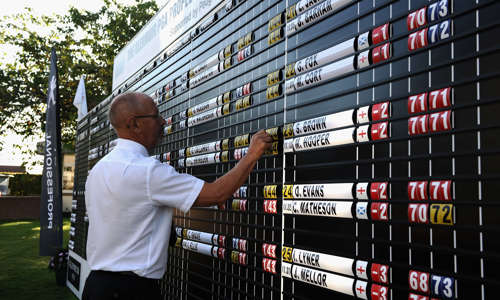It’s something no PGA Professional wants to think about, but knowing what to do following a break-in is crucial, as Matthew Paget explains
It is a PGA Professional’s nightmare – a break-in and the theft of a substantial quantity of hardware from the shop.
This is what happened to Matthew Paget, when his premises at Royal Mid-Surrey were attacked in February 2024 and £150,000 of stock was taken.
Paget runs Forefront Golf, which is the golf services provider to Mid-Surrey, along with The Roehampton Club and Pachesham Golf Centre.
The emotional turmoil caused by an incident like this is only part of the picture. There is also the added stress of contacting police, dealing with insurers, alarm companies and much more as the process begins of putting a business back together.
Paget has already explained how Members should prepare in case a break-in ever happens. Here, he has four suggestions on how to get through such an experience…
Accept the claiming process is long
We had three visits from a loss adjuster, one from a forensic investigator, and all those things take an awful lot of time.
The pressure it had on our cash flow was huge. It took eight months, in all, to be paid out.
Don’t be afraid to accept the help of the membership
We didn’t trade for a couple of days, while we were getting on top of what was missing, and we had to secure the premises. We got a builder to do that quite quickly and, luckily, we’ve got an artisan section at the club and someone came out straight away.
The support of the staff and the membership was massive. I said to our guys, when we were together in the aftermath, that you’re judged by how you respond in tough times, and we need to make sure we become better than before and to show our resilience.
But the membership really want to help, and support, and want to make sure if they can help they will.
What you need to learn from the experience
I never want to go through it again. But I also never want to put myself in a position where I’m hugely financially under pressure – because of the time it takes to pay out as well as the worry that you might not get paid out.
There was, at no point, any reassurance that was going to happen. It’s made me go through my insurance policies with a fine toothcomb and really make sure we know what we’ve got written down in those policies.
It’s made me very aware we can’t have members’ clubs ad hoc in the back. With staff clubs, we need to make sure we have invoices and we know who owns them.
We need to make sure people have their own insurance policies as well. We need to massively reduce our stockholding of hardware and check the work of the alarm companies and make sure they’re signing off on what they are doing.
Make sure your accounting is very much up to date. I would say that in the quieter winter months, it might be worth having a dummy run of what would happen ‘if’.
That sounds ridiculous but it would be a useful exercise, because it is such a terrible thing if it does happen.
Luckily, we had the systems in place to find things very easily, but it still took weeks.




































